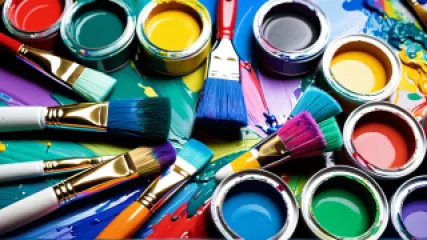The Transformative Power of Art Therapy for Depression
Art has the power to heal, to transform, and to bring solace in times of darkness. It is a medium through which emotions can be expressed, understood, and processed. For those struggling with depression, art therapy sessions can provide a therapeutic outlet for emotional healing. This article explores the transformative power of art therapy for depression and how it can offer hope and support on the path to recovery.
The Connection Between Art and Mental Health
Art has long been recognized as a powerful tool for self-expression and communication. Through various artistic mediums such as painting, drawing, sculpture, and collage, individuals can externalize their internal experiences and emotions. This process allows for a deeper understanding of oneself, fostering self-reflection and personal growth.
In the realm of mental health, art therapy combines the benefits of art-making with psychological support. It is based on the belief that engaging in creative activities can promote healing, reduce stress, and improve overall well-being. Art therapy provides a safe and non-judgmental space for individuals to explore their thoughts, feelings, and traumas.
The Benefits of Art Therapy for Depression
Depression can be an isolating and debilitating condition, affecting every aspect of a person's life. Traditional talk therapy can be helpful, but sometimes words fall short in adequately expressing the depth of one's emotions. Art therapy offers an alternative approach, tapping into the expressive potential of art to facilitate healing and recovery.
1. Emotional Expression: Art therapy allows individuals to express complex emotions that may be difficult to put into words. Through art-making, they can channel their inner turmoil, sadness, and frustration onto the canvas or paper. This process not only provides a sense of release but also helps to make these emotions more tangible and manageable.
2. Self-Exploration and Insight: Engaging in art therapy sessions encourages self-reflection and introspection. As individuals create art, they may uncover underlying themes, symbols, or patterns that reflect their inner world. This self-exploration can lead to a greater understanding of oneself, including the root causes of depression.
3. Stress Reduction: Creating art has been shown to reduce stress levels by promoting relaxation and mindfulness. The act of focusing on the art-making process allows individuals to temporarily shift their attention away from negative thoughts and worries. This can provide a much-needed respite from the constant mental and emotional strain of depression.
4. Building Coping Skills: Art therapy equips individuals with valuable coping skills that can be applied beyond the therapy session. Through art, individuals can learn to regulate their emotions, develop problem-solving abilities, and explore healthy ways of self-expression. These skills can be empowering and assist in managing depressive symptoms.
5. Empowerment and Agency: Depression often leaves individuals feeling powerless and detached from their own lives. Art therapy can help restore a sense of empowerment and agency by providing a creative outlet where individuals have control over their artistic choices. This newfound sense of empowerment can extend beyond the art-making process and positively impact other areas of life.
Online Therapy for Mental Health
In recent years, the accessibility of mental health services has significantly expanded through online platforms. Online therapy offers individuals the opportunity to engage in art therapy sessions from the comfort of their own homes. This mode of therapy can be especially beneficial for those who may have limited access to in-person sessions or prefer the convenience of remote therapy.
Online art therapy sessions typically involve video conferencing with a qualified art therapist. During these sessions, individuals can engage in art-making while receiving guidance and support from the therapist. The therapist may provide prompts or themes to explore, or individuals can freely express themselves through their chosen medium.
While online therapy may not replicate the in-person experience entirely, it can still offer a valuable means of connection, support, and healing. It allows individuals to engage in art therapy even if they are unable to attend physical sessions, providing an accessible option for those seeking the transformative power of art for their mental health.
Therapeutic Art Activities for Depression
Art therapy encompasses a wide range of activities and techniques that can be tailored to meet individual needs and preferences. Here are some therapeutic art activities that can be beneficial for individuals struggling with depression:
- Collage: Creating collages using images, words, and textures can help individuals express their emotions and explore different aspects of their identity.
- Journaling: Combining art with journaling allows individuals to reflect on their thoughts and feelings while incorporating visual elements into their writing.
- Mandala Drawing: Mandala drawing, with its repetitive patterns and intricate designs, can promote relaxation, focus, and a sense of inner harmony.
- Painting: Painting provides a versatile medium for emotional expression, allowing individuals to use color, texture, and symbolism to convey their inner experiences.
- Clay Sculpting: Working with clay offers a tactile and grounding experience, allowing individuals to shape and mold their emotions into tangible forms.
These are just a few examples of therapeutic art activities that can be incorporated into art therapy sessions. The specific activities chosen will depend on the individual's preferences, therapeutic goals, and the guidance of the art therapist.
Art for Emotional Healing
Art has the remarkable ability to facilitate emotional healing by providing a means of expression and exploration. It offers a visual language through which individuals can communicate their inner world, even when words fail them. Through art therapy, individuals can embark on a journey of self-discovery, healing, and transformation.
While art therapy alone may not be a cure for depression, it can be a valuable component of a comprehensive treatment plan. It can complement other therapeutic modalities, such as medication and talk therapy, to provide a holistic approach to healing.
Art therapy for depression holds immense potential for fostering resilience, self-empowerment, and hope. By engaging in artistic processes, individuals can tap into their inner strength, cultivate self-compassion, and find solace in the transformative power of art.
Image source: Unsplash






